- Home
- Joe McKinney
Inheritance
Inheritance Read online
Advance Praise for Inheritance
“When I started reading Inheritance, my first reaction was one word—WOW! I kept reading, and I was blown away. Police procedural? Yeah. Horror novel? That, too. But most importantly—one helluva novel. Joe tells a roaring good tale, and when you finish it, you’ll have a lot to say, but WOW will be the first word out of your mouth.”
—Rick Hautala, author of Glimpses and Indian Summer
“An artful haunting with the gloomy quality of a Terrance Malick crime drama”
—Weston Ochse, author of SEAL Team 666
“With Inheritance, Joe McKinney delivers a first-rate supernatural thriller with edge-of-your-seat suspense, a high-octane plot, and pitch-black horror. Add to this mix strong characterization and an insider’s knowledge of law enforcement, and you have one of the best novels I’ve read in ages. I loved it!”
—Tim Waggoner, author of The Harmony Society and Like Death
“Joe McKinney has proven, yet again, that he is a true literary genius. Inheritance is a breath-taking thrill ride masterfully crafted to grip the reader, pulling them deep into the nightmares of its characters with a level of suspense that steals the breath from your lungs. Brilliant!”
— Gabrielle Faust, author of Revenge and Eternal Vigilance
“Joe McKinney delivers. Inheritance is a brisk, wry and deliriously creepy tale of family secrets and black magic that is guaranteed to get your goat!”
—Harry Shannon, author of Dead and Gone and The Hungry
“Joe McKinney writes with a confidence and clarity rarely seen. With Inheritance, he sets the chill factor high and tells a story that wraps around your spine and refuses to let go.”
—Nate Southard, author of Scavengers and Just Like Hell
“Dead parents. A tormented cop. Pure evil. And that's just the beginning. From the brilliant mind of Joe McKinney comes Inheritance. A gift you don't want...but a story you must read!”
—John C. Farris of Dead, Buried and Back
“A harrowing pre-apocalyptic gem that will leave you in awe. I couldn’t put it down!”
—David Bernstein, author of Amongst the Dead
“McKinney never fails to deliver. With Inheritance he’s crafted a tale and characters that will inhabit you long after the last page.”
—David Dunwoody, author of The Harvest Cycle
“Joe McKinney’s Inheritance immediately joins the upper echelon of classic ghost novels. It is perfectly paced, balancing between moments of beautifully tragic drama and blood-chilling terror and suspense. Billing this as a ‘Police-Procedural Thriller’ does not do this masterpiece justice...with themes of loss and strained relationships, the occult, and the supernatural battle between good and evil, Inheritance examines some of the darkest places of the human heart and soul. This is the work of an author at the top of his game. Inheritance is simply riveting. I loved it.”
—Peter N. Dudar, author of A Requiem for Dead Flies
“Each new work by Joe McKinney is more masterful than the last, bringing you in contact with real, dynamic, flesh and blood characters as you join them on their journeys into madness, horror and (sometimes) redemption. If this is your first McKinney tale, I envy you—you are about to experience the thrill of discovering a new favorite.”
—Mark Onspaugh, author Christmas Ghost Stories: A Collection of Winter Tales
“Inheritance is one creepy story. I’ll be a lifelong fan of anything McKinney writes. You should be, too!”
—Ty Schwamberger, author of The Fields and DININ’
“McKinney gets better with every book and Inheritance proves he’s at the top of his game. Creepy and scary in some parts; reserved and lyrical in others. Inheritance seems like a very personal work for McKinney and you can feel the emotion and passion in every word. Don’t miss this one!”
—Anythinghorror.com
Inheritance
Joe McKinney
Evil Jester Press
New York
Inheritance
Copyright © 2012 by Joe McKinney
All Rights Reserved
First Digital Edition
Evil Jester Press
No portion of this publication may be reproduced, stored in any electronic system, or transmitted in any form or by any means, electronic, mechanical, photocopy, recording, or otherwise, without written permission from the authors. This is a work of fiction. Any resemblance to any actual person, living or dead, events, or locales is entirely coincidental.
Edited by Peter Giglio
ISBN: 978-0615690896
Other books by Joe McKinney
Mutated
Flesh Eaters
Apocalypse of the Dead
Dead City
Quarantined
The Red Empire & Other Stories
The Crossing
Dodging Bullets
Lost Girl of the Lake (with Michael McCarty)
Dead Set (as editor)
The Predatory Kind (as editor)
To my Mom and Dad, who, thankfully, are nothing at all like the mom and dad you’re about to meet.
Nothing is very simple.
You must remember that certain things die out for a while
So that they can be remembered with affection
Later on and become holy.
—John Ashbery
sometimes the moon
and I discern a woman
I loved, drowning in secrets, fear wound round her throat
and choking her like hair. And this is she
with whom I tried to speak, whose hurt, expressive head
turning aside from pain, is dragged down deeper
where it cannot hear me,
and soon I shall know I was talking to my own soul
—Adrienne Rich
Prologue
Paul Henninger was eighteen, a senior in high school, when he saw his mother’s ghost for the first time.
It was early October, late in the afternoon, and he was sitting in the passenger seat of Steve Sullivan’s pickup truck, a bucket of KFC chicken in his lap, watching his house. All the big, commercial ranches around these parts had names—Double Js; Spriggs; Casa Navarro—but Paul’s house wasn’t one of those. Though it had been in his family for four generations, and was ostensibly a working commercial farm and ranch, he had never thought of it as anything more than a tired old farm, his father’s house, the place where he and his father lived and worked.
The house stood knee deep in cheatgrass, nestled far back from the road in the shade of enormous, two hundred year old Spanish oaks that hung thick with ball moss, and sometimes in the summer with gauzelike colonies of web worms the size of lamp shades. The front porch was obscured behind a tangled screen of guajillo and chinaberry, so that from the driveway the place looked tumbledown, a derelict rotting in the weeds. But neither Paul nor his father worried much about appearances. They didn’t use the front porch, and because it served no purpose in their daily lives, it got no attention. As long as Paul could remember it had been a graveyard of rusted machine parts and tools. Things went to the front of the house and were forgotten, like his mother. It was the back of the house, where the long, sloping metal roof was streaked with rust and the wood paneling had turned gray from decades of exposure to the harsh extremes of South Texas weather, where he and his father lived their lives. Everything of significance happened back there, away from the road.
Steve Sullivan was saying something, but Paul’s mind was elsewhere. He was looking beyond the house to the ruined shell of the barn where his mother had hanged herself six years before. The day he came home and found her there had been on his mind a lot lately, even though his memories of that time were cloudy.
“You okay?” Steve asked.
&
nbsp; He waited.
“Paul?”
“I said I’m fine.”
“No you didn’t. You haven’t said a word.”
Paul grunted. He looked back toward the house, lost in a dusty golden haze settling down through the trees.
Steve drummed his fingers on top of the steering wheel. “Hey Paul, if you don’t want to go home, we could go driving around the lake. It might be fun, you know? Cut loose a little. It’s been a hell of a week.”
“Not tonight.”
Again, Steve waited.
Finally, he said, “But you’re still sitting here. What’s wrong with you? Your dad’s pissed about you signing with UTSA, isn’t he? Christ, I told you he would be.”
Paul sighed. He didn’t want to explain this. He didn’t even think he could. The University of Texas at San Antonio had offered him a full ride to play football, and he’d accepted the offer, but what was going on here had nothing to do with that. Steve’s life revolved around football. And, for the most part, Paul’s did, too. Except lately. Lately, ever since he started having flashbacks to his mother’s death, football had faded into the background. But he couldn’t make Steve understand that. His decision to stay close to Smithson Valley, and his father’s farm, was tied to his mother’s death with a knot he didn’t feel smart enough to untangle. The problem was just too big. He couldn’t see it all. But he sensed a connection there. What had happened six years ago with his mother was affecting the decisions he was making now. He just didn’t see how. And that left him frustrated and bored with all the things that used to bring him such joy.
“Paul?” Steve said. “Dude, you okay?”
“I haven’t told him,” Paul admitted.
“You haven’t...?” Steve suddenly smiled. “Bullshit. You’re kidding, right?”
“No joke.”
The smile slid off Steve’s face.
“Dude, you’re serious?”
Paul nodded, then opened the door and got out.
Inside the truck, Steve looked stunned. “You passed up a chance to play for the Cornhuskers and you didn’t even talk to him about it?” Steve looked completely baffled. “We kind of all just assumed you’d...that’d he was making you...”
“No. He’s been pushing Nebraska for two years now.”
“Well, yeah. Christ, Paul, what are you gonna do?”
“It’s my problem,” Paul said. “Don’t worry about it.”
Paul walked away.
“Hey,” Steve called after him. “What about this weekend? You wanna get some beers and head up to the lake with the girls? I don’t know if you’ve noticed it or not, but all you’d have to do is look cross eyed at Jolene Arnold and she’d spread faster than—”
“Yeah, sure,” Paul said. He waved over his shoulder as he walked away. “I’ll see you tomorrow, Steve.”
***
Steve’s pickup pulled away from the driveway. Limestone pebbles popped beneath the truck’s oversized tires as he accelerated up to speed, leaving Paul in a cloud of settling white dust. Late season crickets jumped in the grass all around him. The metal roof of the house was a checkerboard of dappled light and shadows, and from somewhere behind the house, he could hear the goats bleating.
Paul headed around to the back, where a screen door opened into the kitchen. Through the door he could see his father sitting cross-legged on the living room floor, all the lights off and the shades drawn. Martin Henninger was rocking back and forth and murmuring to himself while he constructed another of his lattice-like stick structures. Clearly his dad had been at it for some time, for this particular stick structure was already huge, a good three feet tall.
Paul went into the kitchen and put the bucket of chicken on the table. He didn’t bother to announce himself. There wouldn’t be any point to it anyway. When his father got into one of his spells—that was what his mother had called his father’s meditative blackouts, during which he could sit for hours on the living room floor building his sculptures of sticks and baling wire—he was lost to the world. A train could crash through the house and he wouldn’t notice. Paul slipped out again and went to feed the goats.
A dirt road led down past the barn and out to the fallow land that they called the horse pasture, even though there hadn’t been horses to put there since before Paul was born. A haze of white dust hung over the road, depthless and still. The goats, big, dusky white Angoras, were not hungry, he could see that now. They were huddled together in a corner of the yard nearest the house, buzzing with a sort of mute agitation.
Rattlesnake, he thought tiredly. They were common enough here in the scrub brush of the Texas Hill Country.
“I’m coming,” he muttered to the goats, and took the lock blade knife from his back pocket. If the snake was a little one he’d carry it off to the horse pasture and dump it in the brush. They were good and aggressive, got rid of the rats. But if it was a big one, one of the six footers that sometimes made their way up this far, he’d cut off its head and hang its hide on the barn door, for luck. There were already five others there.
He hadn’t gone but a few steps towards the goats before movement out of the corner of his eye made him stop. His mother was standing by the corner of the barn in a yellow cotton sun dress that fit her rail-thin body like a potato sack on a pole. Strands of her long gray hair moved in the breeze across a face that was drawn and gray with sadness. Her eyes were sunken into her face, giving her a hollow, empty look that sent chills through him.
He had very few memories of her smiling when she was alive, and she wasn’t smiling now. From what his father told him, she’d battled with a double-barreled curse of depression and anorexia for most of her life, and most of Paul’s memories were of her sitting on the edge of the bed in the front room, huddled under a blanket, her eyes unfocused and vague. She looked like that now, fogged over, sad.
Paul stared back at her from across the yard, and though his heart was beating against his ribs like a wild bird in a cage, he couldn’t move. He couldn’t speak. He tried to lift a hand to do...he didn’t know what...maybe wave, maybe try to touch her. But he couldn’t even do that. His fingers seemed to weigh a ton.
He knew she wanted him to speak to her. On some level, he sensed that she needed him to speak, that she couldn’t do whatever it was she wanted on her own. But he was too stricken to open his mouth. He couldn’t get the words out.
She lowered her eyes and turned away. Sparks of sunlight scattered off the side of the barn and seemed to shoot right through her. She took a few steps toward the corner that led to the front of the barn and he lost her there in the shadows.
Then his voice came to him all at once, and he blurted out: “Momma? Momma, wait.”
But she was gone.
Numb, Paul stumbled after her.
He rounded the corner of the barn and saw the front doors were open. The front doors of the barn were never open. His father was very particular about that, and a younger version of Paul had taken plenty of whippings to make sure the lesson took. But they were open now. Blades of grass came loose from the few bales of hay he and his father had stored up in the loft and fluttered down on the warm breeze that blew through the barn’s shadowy gloom. A large sheet of mud-stained plastic moved listlessly, like a drape in an open kitchen window, from a nail on the wall to his left. Watching it, he remembered the day he found her, his mother. He and Steve, two twelve year old boys walking up the driveway through a maze of Comal County Sheriff’s cars, wondering what in the hell was going on. There had been deputies everywhere. And here, in the barn, they’d seen his mother hanging by her neck from the rafters, the corpse stripped of the flesh from the waist down by wild hogs. A group of startled deputies who had been telling grim jokes near the body had come rushing forward to shoo them back outside, away from his mother and the flies that filled the barn’s darkened stillness with their murmuring, and as they pulled him from the barn he’d taken one last look over his shoulder at the horror his mother had become.
But the barn was empty now.
She was gone.
***
“What are you doing out here, boy?”
Paul turned and faced his father. Martin Henninger was in his mid-fifties, a lean and weathered man. His face was clean-shaven and severe, deeply lined around the mouth. His arms were knotted with muscle, toughened by a lifetime of farm labor. He dressed in black pants, a heavily starched white shirt that was always buttoned at the neck and at the cuffs, even in the hottest part of the summer, and an old black Stetson hat. His dark eyes glinted like motor oil in the sun. They were the black eyes of a man who looked on everything, whether it was another human being, or a cut on his finger, or a dead deer on the side of the road, or even a twenty dollar bill he’d found on the sidewalk, with equal indifference.
“Who were you talking to?” his father asked.
“I was thinking about Momma,” Paul said. He wanted to be defiant, like saying her name, her name to him anyway, somehow went out as a challenge, but he knew it was a fantasy and nothing more. His father was too strong, too...too much more than he could ever be. Though Paul was bigger than his father, faster, maybe even stronger, his father was infinitely more than he knew himself to be. The man was a force, a source of power, and Paul was only himself, a boy, a child, a thing that needed tending by this man, who knew better.
But if his father recognized the challenge, he showed no reaction, except to drive his hands down into his pockets and stare off at the deepening shadows spreading over the horse pasture. Paul felt suddenly dizzy and nauseous as his father probed his mind, trying to get into his head. Out of instinct, Paul cleared his thoughts and focused instead on nothingness. But his father’s mind was strong, disciplined, insistent.

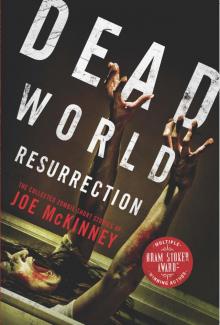 Dead World Resurrection
Dead World Resurrection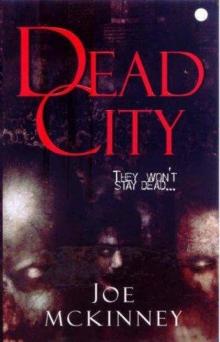 Dead City - 01
Dead City - 01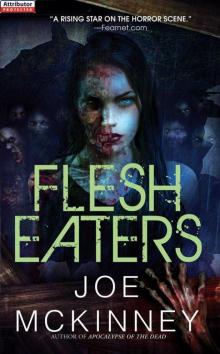 Flesh Eaters
Flesh Eaters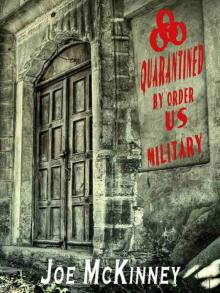 Quarantined
Quarantined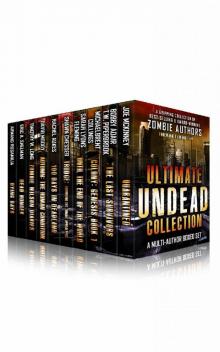 Ultimate Undead Collection: The Zombie Apocalypse Best Sellers Boxed Set (10 Books)
Ultimate Undead Collection: The Zombie Apocalypse Best Sellers Boxed Set (10 Books)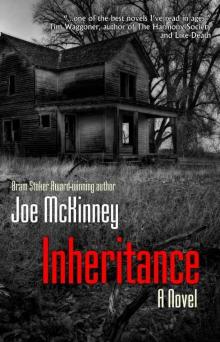 Inheritance
Inheritance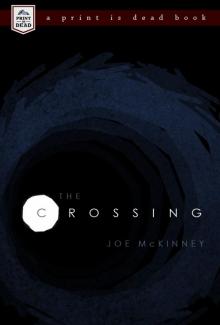 The Crossing: A Zombie Novella
The Crossing: A Zombie Novella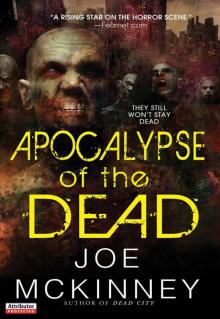 Apocalypse of the Dead
Apocalypse of the Dead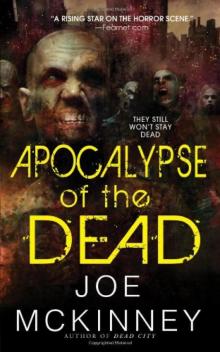 Apocalypse of the Dead - 02
Apocalypse of the Dead - 02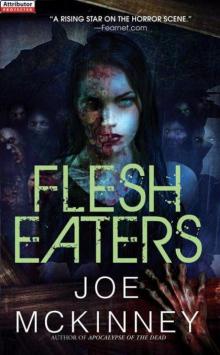 Flesh Eaters - 03
Flesh Eaters - 03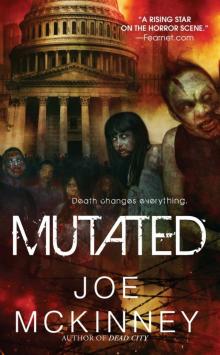 Mutated
Mutated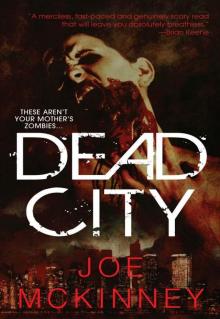 Dead City
Dead City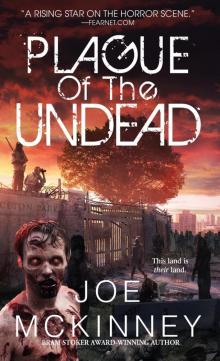 Plague of the Undead
Plague of the Undead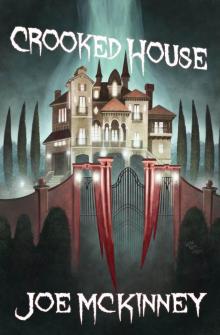 Crooked House
Crooked House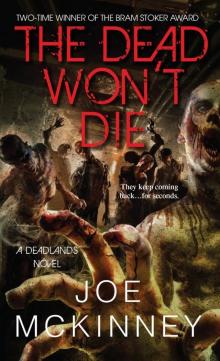 The Dead Won't Die
The Dead Won't Die